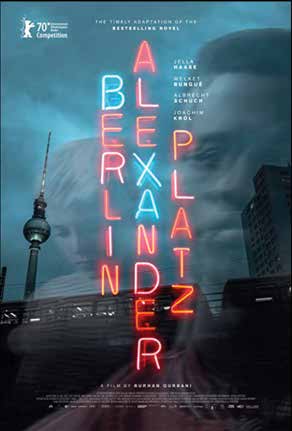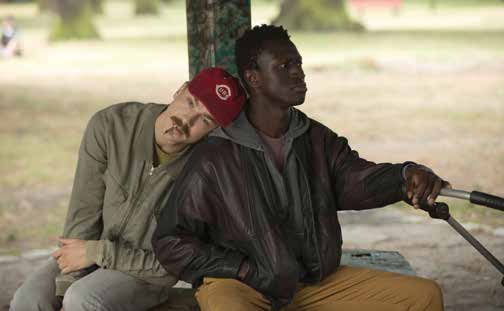
By Gary M. Kramer–
A new adaptation of Alfred Döblin’s Berlin Alexanderplatz arrives on DVD August 31. (It is also available on demand.) This sweeping, 3-hour epic about good and evil is decidedly different than the celebrated 1980 Rainer Werner Fassbinder version set in the 1920s. Here, the protagonist is Francis (Welket Bungué), a refugee from Guinea-Bissou who arrives in contemporary Germany hoping for a better life, only to get trapped in the criminal underworld.
Director Burhan Qurbani, who also co-wrote the screenplay, opens his film with a striking, upside-down shot of Francis and Ida (Thola von Hulbert) in the ocean as she drowns. It is a memory that haunts Francis in the shower, or at other times in his fateful life; a symbol of loss and grief. It also is why he swears to be a good man. However, as the film’s narrator—later revealed to be Mieze (Jella Haase)—explains, Francis fails to be decent, and becomes broken instead. As Berlin Alexanderplatz unfolds in five parts plus an epilogue, viewers experience his story of survival and resilience.

Qurbani shoots his film in a bright, glossy style that provides a notable contrast with the seediness of the characters and their environment. It’s an interesting choice, but one that pulls viewers into the action. The saga begins with Francis working a construction job. After he helps an injured coworker, he gets fired for his actions. This prompts him to hook up with Reinhold (Albrecht Schuch), a flunkie for Pums (Joachim Król), a local (and possibly queer) gangster. Reinhold offers the undocumented African workers jobs dealing drugs. Francis is reluctant to participate, but he asks the seductive and convincing Reinhold for a passport in exchange for his loyalty.
Reinhold quickly exacts a hold on Francis, whom he renames Franz. A parasitic relationship develops between them. Reinhold eggs Francis on to share the women he brings home and abandons, and the two men treat each other tenderly, even sharing a bath. Reinhold calls Franz his brother, but he is untrustworthy, luring Francis in, gaining his confidence, and using him.

Moreover, Francis is told by Eva (Annabelle Mandeng), a nightclub owner, and her trans lover Berta (Nils Verkooijen), that Reinhold will only exploit him. They care for Francis one night when he trips on drugs. (Reinhold slips him something with a kiss.) Eva and Berta, who are voices of reason, later introduce Francis to Mieze, a sex worker. Mieze takes Francis in after he is seriously injured. While Francis and Mieze fall in love, Reinhold becomes jealous and determined to spoil their happiness.
Berlin Alexanderplatz crackles because Welket Bungué is magnetic in the central role. Francis endures considerable hardships, but the actor makes his heartbreaking character sympathetic with every reversal of fortune. Bungué plays Francis as a striver and a victim; he has little control over his circumstances, but it is his palpable wrestling with good and evil—wanting to do right but making bad choices—that makes the film so engaging. Bungué conveys Francis’ restlessness through in his body language. He is coiled up in some scenes, seething with rage at times, or strutting with a confidence that suggests having power that turns out to be tenuous at best.
Bungué is well matched by Jella Haase, who turns in a slinky performance as Mieze, a young woman who, like Francis, is equal parts tough and fragile. But it is Albrecht Schuch, as Reinhold, who gives the film’s most dynamic turn. Wired and wily, Reinhold plays hurt and fragile, but snaps and seizes control. He is a petty man who tries to curry favor with Pums, although Pums is more enamored with the hungry, observant Francis. Just as Reinhold is jealous towards Mieze he also envies the dynamic between Pums and Francis. Berlin Alexanderplatz is both gripping and painful as Reinhold manipulates things to cause Francis and others harm.

Qurbani keeps the action nimble—the film’s three hours pass very quickly—even during the lengthy third part where Mieze and Francis’ romantic relationship develops. The middle act sets up the film’s escalating, melodramatic climaxes. These episodes are effectively presented in arresting set pieces and feature some nifty camerawork. The film is especially well lensed, despite some arty, unnecessary moments depicting Francis encountering a bull—a clunky symbol for his struggles.
There is a fabulous, decadent costume party given by Eva and Berta, which also gets at the racism inherent in Francis and Reinhold’s relationship. (Francis is given an ape costume, while Reinhold shows up as a Great White Hunter.) The film uses this motif and other scenes as a way of commenting on “the New Germany,” and the immigrant crisis.
This version of Berlin Alexanderplatz is full of despair, but it also has considerable soul, spirit, and heart.
© 2021 Gary M. Kramer
Gary M. Kramer is the author of “Independent Queer Cinema: Reviews and Interviews,” and the co-editor of “Directory of World Cinema: Argentina.” Follow him on Twitter @garymkramer
Published on August 26, 2021
Recent Comments